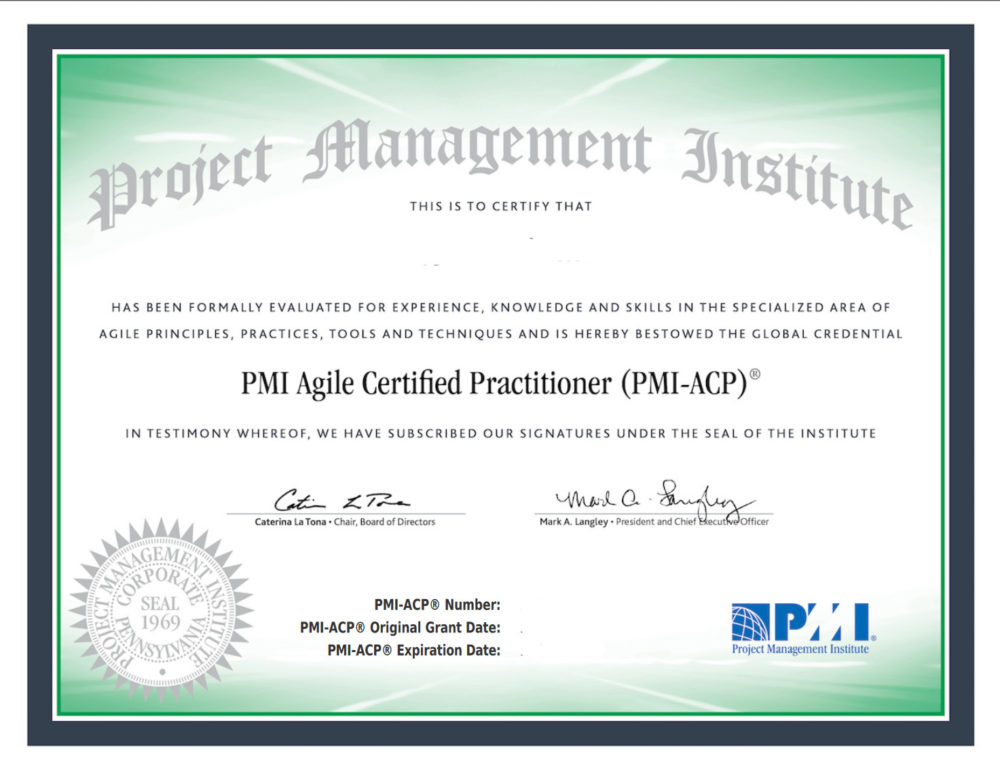What is PMI-ACP certification?
A PMI-ACP (Agile Certified Practitioner) is a globally recognised and accepted qualification established by the Project Management Institute. Due to the growing prevalence of agile trends, project stakeholders are expected to have structured knowledge and a practical agile toolkit. The world's largest project management organisation has created this qualification to enable the experts concerned to demonstrate their knowledge and experience through a single, objective measurement system (exam).

As agile tools are often not applied by many organisations through a pure agile approach, the PMI-ACP certification is not role-focused (it is not just created for scrum masters, POs, agile coaches or developers), but rather a mindset-based certification. The curriculum covers the basics of agile mindset, different agile trends (Scrum, XP, Lean, Kanban, Crystal, DSDM, FDD) and the toolset that can be used in their implementation. It may seem heretical to many, but the PMI approach is that there can be an agile (project) manager who has to support the project and the team according to a completely different approach than the traditional approaches. The reason is that agility is not only effective in the context of internal IT development, the business environment often overrides the 'pure' applicability of certain policies, which can often be applied in hybrid, mixed, customised environments or mixed portfolios.
Who is the PMI-ACP certification recommended for?
The PMI-ACP certification is recommended for professionals who implement projects in an agile environment. These can be Product Owners, Scrum Masters, Agile Coaches, Project Managers or even Team Leaders. Since having the PMP certification fulfils some of the prerequisites (2,000 hours of project experience), it is also specifically recommended for PMP certified individuals. With this qualification, PMPs can be deployed in new areas and, as the number of PMP qualifiers is growing at an extraordinary rate (nearly 900,000 worldwide), the PMI-ACP can help them differentiate themselves (in addition to soft skills and industry experience) from other project managers.
The certification provides the certified with a toolkit and process that, when properly tailored and applied, will help them to operate in an agile environment, start a new agile team, or even undertake agile transformations.
What are the benefits of certification?
As part of this year's international survey, PMI asked more than 4,400 project managers and project management experts about the practices and trends they see in their organisations. On average, 47% of respondents said they have adopted a traditional approach over the past year, while 46% have adopted agile or hybrid solutions with agile elements. The survey results also show that a very low proportion of the organisations concerned manage their projects according to a single approach in all cases, with a mix of traditional and agile approaches being used in the vast majority of cases.
As mentioned above, in the modern project management profession, it is no longer enough to be a project manager with a toolkit of one approach. The advantage of certification for the employee is that it certifies deep knowledge and appropriate competencies, making the certified person more valuable and deployable in more types of projects. Of course, surveys show that this also means higher earnings and greater career prospects. In addition to the certificated, employers and contractors are increasingly expecting the certificates. In international projects, it is a standard requirement, but a minimum advantage to have a qualification, as this 'value-adding' qualification also positions the expert higher in the market, allowing them to be sold for higher fees for projects and, in the case of internal projects, to be successfully employed in more areas. The latter has become particularly important in recent years, as it allows an employer to cover more roles with one person.

Why choose PMI-ACP?
As we wrote in a previous post, there are many certifications available in the market. Of course, the choice is up to each individual's own taste, but we consciously prefer and chose PMI certifications because it is the only organisation that offers high level, internationally recognised project management, business analysis and agile certifications. We believe it is important that these now form a system, that they are not separate isolated qualifications, but that the links between them have been established.
Another argument in favour of PMI-ACP is that it covers multiple methodologies, i.e. it is not only applicable in a SCRUM environment. Experts who work with diverse, agile or hybrid approaches are able to apply the tools they have learned through this process to a large extent. Of course, we would not be objective if we did not mention the drawback: the PMI-ACP certification is extremely difficult to obtain, it cannot be obtained automatically by attending a training course or by passing a short, very simple exam.
Given the above, and considering that this certification has become the fastest growing certification worldwide in terms of the number of certificants in recent years, and that last year's survey on the salaries of international project management stakeholders found that PMI-ACP certificants have the highest average salaries, PMI-ACP certification may be a rational choice.
Our personal experience of the latest exam is described in our next post.

